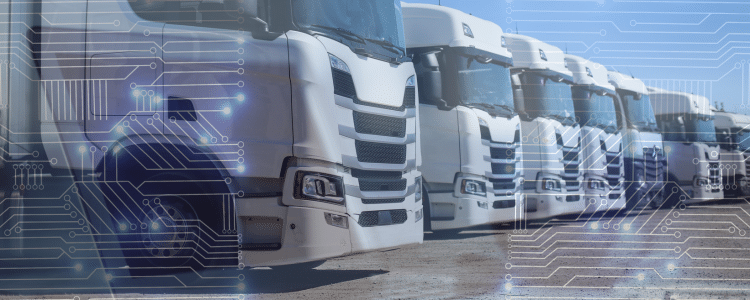Advancements in AI and fleet technology . . .
The explosive growth of the eCommerce sector . . .
These are the movements behind the increased adoption of IoT in fleet management.
If your company is focused on improving your fleet management operations, then IoT is an important technology to understand. Today, we’re sharing how it works in this context and the benefits you can expect.
The Role of IoT in Fleet Operations
Fleet managers are responsible for ensuring all company vehicles are safe, high-performing, and efficient. This often involves multiple, disparate tracking devices.
Unfortunately, when the data in each device can’t “talk” to any other device, data silos begin to form. Especially in large enterprises, a lack of visibility can be incredibly detrimental.
Many of the top ERP systems on the market incorporate IoT technology that can help make fleet operations more visible, less expensive, and easier to manage. Companies can use this technology to transition from single-use data collection systems to in-vehicle computers. These tools can track and consolidate data and process it in near-real-time.
Software Selection & Process Improvement Case Study
In helping the client get its project back on track, one of our primary focus areas was decreasing their customization needs by improving their processes to align with the system's best practices.
How it Works
Advanced telematics solutions collect data from IoT devices on vehicles and transmit it to a central location where it can be used to generate real-time reports. This gives fleet managers, drivers, and logistics operators the data they need to make informed decisions.
Many telematics solutions store and share data related to roadway conditions, using up-to-the-second data obtained from GPS technology. Some solutions also use artificial intelligence (AI) tools to improve onboard diagnostics.
With IoT-enabled ERP or SCM systems, fleet managers can collect and track key insights, such as:
- Total fuel consumption
- Engine diagnostics codes
- Maintenance frequency
- Delivery ETAs
- Driver performance
- Vehicle location
There isn’t one vendor or one platform that’s leading the pack. Rather, this industry continues to evolve. As more fleet operators connect their growing networks via IoT-enabled devices, they’re using cloud-based, built-in processor tools to connect fleet managers with their vehicles and drivers.
Benefits of IoT in Fleet Management
With so many moving parts in logistics operations, it’s easy to see how fleet operators could benefit from platforms that unify and streamline their work.
Most companies already have the data in place, but they lack a way to organize it. When IoT solutions are deployed in this arena, this all changes.
There are several benefits that companies can realize:
- Greater operational efficiency
- Improved visibility
- Lower overall costs
- Easier route planning
- Streamlined service calls
- More accurate predictive maintenance
- More efficient internal/external vehicle monitoring
When business owners can keep a constant digital eye on every member of their fleet, they can make data-driven decisions, such as:
- When to perform predictive fleet maintenance
- How to improve driver operation
- How to properly monitor cargo
Until recently, these decisions were made based on historical data or inaccurate forecasts. With IoT, the data is always current and accessible. In addition, it has one other valuable element: context.
For instance, users can access IoT insights to not only understand the condition of their vehicles but also factors that might be influencing their status, such as where they’re located and what type of work is being performed on them.
The Future of Fleet Management
The use of IoT in fleet management will likely continue to grow, driven by industry trends, such as:
- The modernization of infrastructure through digital/physical integration
- A focus on more equitable transportation
- The drive to boost economic growth and support climate responsibility
Cities are already integrating IoT and related technology into their existing infrastructure to keep up with population growth and increased urbanization. The goal is to stay ahead of concerns around public safety, traffic blockages, and the associated environmental impact.
As cities continue to expand and supply chains grow in complexity, logistics leaders will increasingly turn to flexible solutions that will allow them to pivot and adapt as necessary.
Many companies will succeed in this regard. Others will bravely attempt to transition from legacy systems to modern technologies but will struggle to manage the data migration.
Companies that don’t take the time to prepare their data before moving it to new systems are at high risk for implementation failure. The software litigation consultants on our computer software expert witness team have seen so many failures of this nature that they are strong proponents of proactive data management when working with ERP selection clients.
Leverage the Power of IoT for Your Fleet
Managing a fleet comes with a great deal of risk and uncertainty. To manage this risk, companies need an efficient and reliable way to collect and analyze large volumes of data.
Many companies are implementing IoT platforms to redefine their data strategy and modernize their fleet operations. These IoT solutions are delivering real-time data insights on vehicle maintenance, driver performance, cargo management, and more.
If you are a fleet owner or fleet operator who sees value in using IoT to optimize fleet performance, our enterprise software consultants can help you conduct a technology assessment of your current state and determine what you need from new software. Request a free consultation below.













